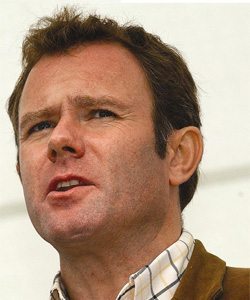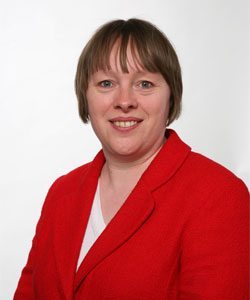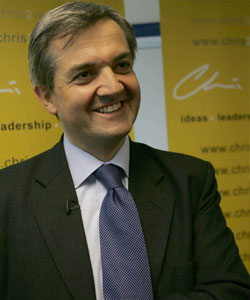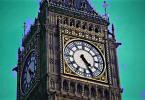
The 2005 intake of MPs contained the usual mix of the good, the bad and the barmy. There were dozens of new Conservative MPs, a brace of freshman Lib Dems and hardly any new Labour faces at all.
The new Tory boys and girls were instrumental in propelling David Cameron into power, and he has rewarded the best and the brightest with seats in his Shadow Cabinet.
Nicholas Le Quesne Herbert is one of two Nicks who first sat on the green benches two years ago to keep an eye on in the years ahead.
Great expectations follow them around the corridors of Westminster.
While Nick Clegg is the clear favourite to become leader of the Liberal Democrat party later this month, Nick Herbert is making a name for himself as one of the new stars of the Conservative frontbench.
As Shadow Justice Secretary, he speaks for his party on diverse topics such homophobic incitement, prisons, constitutional reform and the funding of political parties.
The first openly gay man to be elected as a Conservative MP, he is destined for a frontline role in any future Cameron administration.
When we met in his Commons office the government was under siege over dodgy donations, and the new Tories were getting their first taste of just how badly the next few years could go for Prime Minister Gordon Brown.
Nick was, unsurprisingly, in a good mood as we talked gay rights, the future for party funding and how it feels to be a minority MP.
Let's start with the government's woes. What is your take on the donations scandal?
It appears that Labour has systematically attempted to undo or evade its own party funding laws. This will dismay the public.
What is doubly serious is not only that the law has been broken, as the Prime Minister said, but there has been a systematic attempt to evade the law by the party that was parading its high moral credentials in introducing this legislation, beating up all the other parties at the time for their approach to this matter, and yet has sought to evade its own legislation not once but twice.
Labour's chief fundraiser, Jon Mendelsohn, who was appointed by the Prime Minister in June, learned about Mr Abrahams' proxy donations last month, but was unaware that they were illegal. Is that credible?
It is completely incredible that those people who are officials involved in this fundraising effort do not understand the law.These are now matters for criminal investigation but in my view these are very serious indeed.
What do the Tories propose by way of reforming party funding?
We have called for a cap on all donations from whatever source, of £50,000, and unfortunately that is not possible. Labour is refusing to agree to that because they will not cap union donations.They should rethink that policy urgently.
It is clear that we need to build public confidence in the way in which parties are funded.The union bosses have control over these funds and we just think there should be one rule that applies to everyone.
But what about your own party. Are you entirely confident your own house is in order?
We are absolutely sure our own house is in order, that has been made clear. We know who all our major donors are.
We go through all the proper compliance procedures, but we have said let's have a cap on donations so that no party has to be reliant on major donations.
And what about public funding for political parties?
We are much more interested in reducing the cost of politics and that is what David Cameron has made clear.
Speaking of David Cameron, you must be very upset that his trip to Washington DC was overshadowed by this awful government scandal?
Well, all Shadow spokesmen over the last two or three weeks been making major speeches, I made a major speech on prisons, which are all receiving far less attention than they might otherwise have done.
I proposed to sell off our Victorian prisons. That was a fairly radical thing to suggest, but the government has found itself in such difficulties. That's politics.
Let's turn to incitement to homophobic hatred. At party conference in October you said that you'd wait to decide on whether to support it until you saw the amendment.
The government's now brought the amendment forward. Tell us what you feel about the government's proposals needs finessing or changing?
Well firstly just to make it clear, in committee the government's amendment went through without a vote, and the official opposition broadly supported the approach.
We think that hate crime has no place in a civilised society and inciting violent hatred against gay people plainly is totally unacceptable. The question is where criminal law should be drawn.
You and I would agree that when people say things which are abusive or insulting about gay people that that can be hurtful and wrong and in our eyes unacceptable but that's not to say that it should always be a matter for the criminal law.
I think that where there seems to be a consensus is that we must just make sure the law is drawn in the right place so that it's outlawing those acts which incite violence but is allowing free speech.
It's what Stonewall describes as "temperate comments" and that's what I think we are all trying to achieve, I don't think there's any disagreement about that between the major parties. We tabled our own amendment which had a very similar effect to the government and the minister said that she welcomed much of the amendment.
This matter will come back to the floor of the Commons I suspect, and I think that there will be Members of Parliament who are simply seeking reassurance that free speech is not going to be outlawed.
That people who have very strong religious conviction are going to be able to express disapproval of gay people. You know, I wish they wouldn't, of course. I think they're wrong but I think they must be allowed to hold those views and express them in a temperate way, provided, that is totally different, to someone seeking to incite hatred that is going to lead to violence against a community by spreading really vile literature and so on.
You seem to be saying that the lessons from the Race and Religious Hatred Bill have been learned.
I think the government has learned them and that's why they've modelled the provision more on the religious hatred side but we will just need to make clear, now it could be through guidance. It may be that the government's amendments doesn't require any further amendment.
We don't want to see the protection that the government is offering significantly weakened.
What we want to see, ensure is that free speech can be protected. It may be that that can be done in the form of guidance and so on. So I think it will need further debate, but I think also there is good will on all sides to try and get this measure onto the statute book.
Those two groups normally referred to as Christians and comedians will still be able to express their views, mock, insult or abuse?
Yes, as you know insulting or abusive words are out of the protection and that I think is a major difference between the racial and religious hatred legislation.
It should give the protection which the church seeks and comedians and so on seek. Now that means that they are going to be able to say things that makes us very uncomfortable, but we must engage with them and recognise that actually what we are trying to protect here is a decent civilised society and one of the qualities of a decent civilised society is that it protects free speech, except where that free speech really has to be criminalised.
It seems to me there has been an almost a wilful misunderstanding of legislation as it affects gay people. There seems to be a similar kind of misunderstanding of IVF provisions. Where do you think that misunderstanding about 'gay' legislation comes from and does it amuse or frustrate you when you read reports that are so wildly inaccurate?
It doesn't often amuse me. Sometimes its because proposals are made without the detail yet being available and I think that was the case in relation to the government's proposal on incitement to homophobic hatred.
I think people thought that it was going to be a wide-ranging offence that would prevent them from saying things that were perhaps comment on the basis of their Christian belief or some kind of joke.
As people see how the legislation is drafted they will become rather more reassured.
How do you feel about being a minority MP?
Am I a minority MP?
Well you are, aren't you? You're a gay MP and that makes you a minority MP in the same way that if you were black you would be a minority MP, or a Muslim, you'd be a minority MP. So clearly you don't think of yourself as a minority MP?
No I don't. I think of myself as an MP as a constituency Member of Parliament doing my best to represent my constituents in West Sussex.
I don't like labels that put people into a box and I think I've always taken the view that I wanted to be selected on my merits. I wanted to be elected on my merits and I think I was.
I want to be able to say things without people putting a label on and I think that's what a lot of gay people want. They just want to be treated as equal people in a society in which we live. They don't necessarily want to say, I'm different. Please treat me as different.
Rather the reverse, they want to say, I'm the same. Please treat me as the same. But having said that, the one thing that I have come to realise since I was elected as an out gay MP is that it's very important to other gay people.
Much more important than I realised. And I've come to realise that through the emails and letters that I get from individuals, including young people, including people going through school, including people who are actually trying coming to terms with coming out at a much older age.
Not just people who are Conservatives but often people who are, not surprisingly, in my own political party, they write and they say thank you for being out and open, because you've given me great hope that I might one day be able to be a Conservative councillor or a Conservative MP, or just be whatever I want to be in my community, without people thinking that there's anything wrong with that.
I've really come to understand that.I think initially I was trying to say, "yea look right I'm gay, next question," but actually it does matter, it matters to other people because we still live in a society where people feel inhibited about being open about their sexuality.
I've realised Alan Duncan (the other out gay Shadow Cabinet member) and I do have an important role in the Conservative party in making people say "look the Conservative party has changed, it doesn't matter if you're gay or straight, what matters is that you're Conservative."
You've had a pretty rapid rise to power.
Well I haven't got power yet.
Well, you know, influence. You're in the Shadow Cabinet and you've only been in Parliament for two years and a couple of months. What do you ascribe that to?
(Laughs) You'll have to ask others. I think I've been incredibly fortunate, you know I was selected at the last moment for a constituency in a fantastic part of the world.
I live in Arundel which is just a great town for anyone who's visited it. I feel incredibly privileged to be an MP, but I feel really privileged to be representing Arundel and the South Downs, it's a great part of the world and I'm very lucky and I also feel lucky because I've kind of come in to this just at the time when the political sands are shifting.
We have a new leader who has transformed the position of the Conservative party.
You mentioned your constituency, I was having a look at your schedule which you've very kindly put on your website. It seems that you're going to two Christmas parties in the next few days. How many Christmas parties does a conscientious constituency MP have to go to?
I don't know. But I think I'm doing about 20. By the time I get to Christmas, I'm never going to want to look roast turkey in the face again that happened last year.
The truth is if you're like me and really enjoy Christmas, I actually think that it's good fun, I have the opportunity to do it 20 times over.
They've started already, they started in November. I have a very busy life in the constituency, going to community events, going to my local party events.
There's a very strong sense of community in the villages I represent and it's a very big constituency so there are lots of villages in it so there are always things going on.
Apart from the great, huge enjoyment of being an MP is that you do four days a week up in Westminster, that's kind of intense and everything, but then you are down in the constituency doing the community work and it's actually that side of things that I really look forward to.
Talking of the constituency, well I get asked a lot if you've got a boyfriend, but I understand you do have a partner called Jason?
Yeah.
You've broken a lot of hearts there Nick.
That's very kind of you!
Does he have to do the role of the constituency wife?
Well I think a lot of the younger MPs of whichever party, whether they're gay or straight, it's very likely that their partners will be working, will have their own careers.Jason certainly is, he's a solicitor so he has his own career.
He often jokes about making vol-au-vents and so on, but the truth is since he can't cook to save his life, so it's plainly not true.
Jason was welcomed by the local party from the minute that I was selected and he supports an enormous number of the local activities, comes along to them and he's just treated as anybody else is treated.I think it's one of the marks actually of the way in which the Conservative party really has changed.
We haven't had an iota of criticism or rejection, rather than the reverse. He'll be coming along to one of the lunches that I'm going to tomorrow and they've specifically asked him to.
Do you think that model of the constituency wife is a little bit outdated?
What I think is outdated is the idea that you might have a partner and you are the principal person and your partner is the secondary person.
That's completely an outdated model. I think that being an MP is a job where I would find it very difficult to do without the kind of support that I get from him and I think a lot of MPs would say that about their wives, their husbands and their partners.
How long have you two been together?
Eight years.
Were you out at university, after university?
No, not at all. I mean I think that like a lot of people I was kind of crap about this, you know, really, really crap about this. And the thing is of course, once you're out, it's so easy to forget just what a huge deal this is. And at whatever age you are.
When I got around very late in the day to telling my friends, family and so on, and the funny thing was that a lot of my friends just said "Yes, right, well we kind of guessed that, you know, it's taken you a very long time to come right to telling us."
For a lot of young people and for old people it is still the most difficult thing to do and people need a lot of support and so on. Be reassured that it may seem the most difficult thing, but coming out will make you feel honest, powerful and liberated.
Do you feel now that the Tory party is there in terms of being fully accepting of gay, lesbian, bisexual and transgender people?
I think the party, I think we really are getting there.
We hear different things from the Tories in the House of Lords every time they talk about gay rights.
I think it is self-evidently that the party has moved. You have two out gay MPs both of whom happen to be in the Shadow Cabinet. You got the stances that, the frontbench led by David Cameron. we took on the sexual orientation regulations, the stance that we have taken in relation to this incitement to gay hatred provisions.
Still the bulk of the party, the majority of the party it would appear, voted against.
Actually most people didn't vote that day, because the vote was not expected and people weren't there, as I explained at the time.
Surely, the important thing is the signal that the frontbench was sending. I see among my own intake, which is about 50 conservative MPs who were elected last time, a change of attitude.
And I think it's fair to say that some of the recent legislation has raised very important issues about freedom of religious conscience. Both the Sexual Orientation Regulations in respect of gay adoption and the current regulations in relation to current bill, incitement in relation to free speech, and you shouldn't dismiss that.
And there are plenty of people, including gay people, including people who are otherwise very sympathetic to the gay rights agenda, who have concerns about this legislation, that it should not go too far, that it should be balanced, should protect free speech, should protect freedom of religious expression.
I didn't think myself that the sexual orientation regulations as it applied to gay adoptions was an easy issue to decide, because it appeared to involve competing rights.
I think that it's quite clear that we are a party that is changing its attitudes towards gay people and I am very proud of the fact that we are doing so and have a leader who is determined that is one of the things we should do.
Read an interview with Lib Dem Justice spokesman David Heath here.

http://www.pinknews.co.uk/news/articles/2005-6306.html
 I wrote this story today. It made me smile.
I wrote this story today. It made me smile.
 I wrote this story today. It made me smile.
I wrote this story today. It made me smile.










 After a year away from blogging, I have decided I can’t live without it.
After a year away from blogging, I have decided I can’t live without it.






